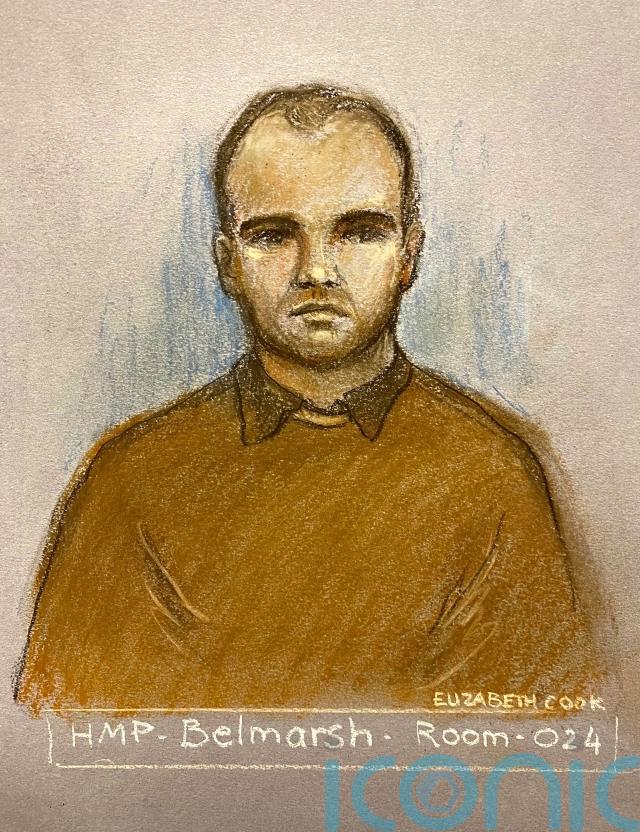
The Crown Prosecution Service (CPS) has said that a trial involving alleged Chinese spying in Parliament collapsed after the Government refused to brand Beijing a threat to national security.
Director of public prosecutions Stephen Parkinson said the CPS had tried “over many months” to get the evidence it needed to carry out the prosecution, but it had not been forthcoming from the Labour Government.
The case against Christopher Cash, a former parliamentary researcher who worked closely with MPs, and Christopher Berry – who both denied the charges – was dropped last month.

Here the PA news agency answers key questions about the case.
– What were the two men accused of?
Mr Cash and Mr Berry were charged by the CPS in April last year with the offence of spying under the Official Secrets Act 1911 after they were accused of collecting and communicating information which could be “useful to an enemy” between 2021 and 2023.
They were first arrested in 2023 as part of a probe involving counter-terror police.
Mr Cash, 30, from Whitechapel in London, was a parliamentary researcher at Westminster who worked closely with senior MPs. Mr Berry, 33, was an academic from Witney in Oxfordshire.
– Why was the case dropped?
Charges against the two men were dropped by the CPS on September 15.
Their trial had been due to go ahead this month.
Until this week, the CPS had declined to explain the reasons except to cite an “evidential failure”.

– What has the CPS said now?
Mr Parkinson, in a letter on Tuesday, blamed Sir Keir Starmer’s administration for the collapse of the trial, saying it did not provide evidence needed to proceed.
He suggested that while there had been enough evidence to prosecute when charges were brought last year, a precedent set by a subsequent espionage case had raised the threshold required to secure convictions under the Official Secrets Act.
The country’s chief prosecutor said he was taking the “unusual” step of sharing more details given “Government briefings have been provided commenting on the evidential situation”.
– What does the Official Secrets Act say?
Mr Parkinson said the CPS’s decision to charge Mr Cash and Mr Berry in April 2024 had been “correct”.
“This was on the basis of where the law stood at that time in relation to the requirements of the Official Secrets Act 1911,” he wrote.
To prove the case under the legislation, prosecutors would have had to show the defendants were acting for an “enemy”.
The Official Secrets Act says that a person is guilty of espionage if they act in a manner “prejudicial to the safety or interests of the state” and passes on information which might be “directly or indirectly useful to an enemy”.

– So what changed?
Mr Parkinson said the CPS decided “further evidence should be obtained” in order to prosecute in light of a High Court judgment earlier this year in the case of six Bulgarian citizens ultimately jailed for spying for Russia.
They were found guilty under the Official Secrets Act.
He wrote: “A High Court decision (R v Roussev and others 2024) ruled that ‘enemy’ for the purposes of the 1911 Act includes a country which represents at the time of the offence, a threat to the national security of the UK.”
– What was the R v Roussev case?
In May, six Bulgarians were jailed after being convicted of spying for Russia on an industrial scale.
Ringleader Orlin Roussev, who led the spy ring from a rundown guesthouse on the east coast of England, was sentenced to 10 years and eight months.
Police said the group, which also included female “honeytrap” agents, put lives and national security at risk.
Judges ruled that, to meet the “enemy” requirement in the Official Secrets Act, prosecutors needed to show that Russia was a “state which presently poses an active threat to the UK’s national security”.

– How did it influence the alleged China spy case?
Mr Parkinson said the CPS realised that this threshold could not be met in the China case, and sought to garner more evidence from the Government.
But ministers’ refusal to provide evidence that Beijing was a threat to UK national security was the main reason it stopped the case, according to the CPS chief.
He wrote: “Efforts to obtain that evidence were made over many months, but notwithstanding the fact that further witness statements were provided, none of these stated that at the time of the offence China represented a threat to national security, and by late August 2025 it was realised that this evidence would not be forthcoming.
“When this became apparent, the case could not proceed.”
– How has the Government responded?
Prime Minister Sir Keir said “all the focus” on the collapse of the trial “needs to be on the policy of the Tory government”.
He has insisted the previous Conservative administration’s stance on China was the reason the case was dropped because it had not deemed Beijing to be a threat to national security at the time of the alleged offences.
The Government has called China a “sophisticated and persistent challenge” but Sir Keir said it was the previous government’s views which counted in the court case because that was what applied when the alleged offences occurred – and the Tories had not called Xi Jinping’s country a threat either.
He said that as the alleged offences took place between December 2021 and February 2023, the Tory administration’s approach to China had to be considered in courtroom evidence.
The Tories at the time declined to describe China as a threat, and the Prime Minister told reporters: “That’s not a political to and fro, that’s a matter of law. You have to prosecute people on the basis of the circumstances at the time of the alleged offence.”

– What have others said?
Critics have pointed to Sir Keir’s attempts to build relations with the world’s second-biggest economy as a possible reason for the Government’s reluctance to label China an “enemy” or threat to national security.
Tory leader Kemi Badenoch claimed in her Conservative Party conference speech that Labour “deliberately collapsed” the trial to “suck up” to Beijing.
Tory chairman Kevin Hollinrake told the PA news agency that the allegation was of “people spying at the heart of government, and we are not willing to say that China is a threat to our national security”.
He insisted the previous Conservative government had “always said” China was a threat to national security “in certain areas”.
Former Tory party leader Sir Iain Duncan Smith, a prominent China critic, also said the Government’s “excuse for collapsing this trial … does not hold water” as he set out Conservative policy on China in 2023.
Yet more evidence that Starmer is not telling the truth about the collasped China spy case. 👇The Labour government’s excuse for collapsing this trial – the most significant breach of parliamentary security in decades – does not hold water.1) The Crown Prosecution Service was…
— Iain Duncan Smith MP Chingford & Woodford Green (@MPIainDS) October 8, 2025
He said on X: “The Integrated Review Refresh, published one month before the two defendants were arrested was clear ‘The UK will further strengthen our national security protections in those areas where the actions of the CCP pose a threat to our people, prosperity and security. This means protecting ourselves at home.”
At the same time, MI5 was warning about the severity of the threat posed by China and a report being completed Intelligence and Security Committee “included reams of government evidence”, Sir Iain added.
Mr Cash had previously worked for senior Tory MP Alicia Kearns, who called on ministers to “come clean” about the collapse of the case following the DPP’s comments.
She told PA: “The Government must come clean – who is responsible for spiking the prosecution?
“Continued stonewalling only invites further concern of concealment or conspiracy.”
– What is the Government’s stance on China?
Labour is seeking to forge closer trade ties with Beijing as it attempts to grow the UK’s economy, one of its chief missions in Government.
David Lammy, as foreign secretary in June, said not engaging with China, which has delivered a third of global economic growth in the past decade, was “no choice at all”.
The “China audit”, which examined the extent of the UK’s relationship with Beijing, recommended increasing the Government’s ability to engage with the Asian economic superpower while increasing “resilience” against the risks posed by the country amid increasing spying, interference and attempts to undermine the economy.
– What have law experts said?
Nick Vamos, from law firm Peters & Peters and a former head of special crime at the CPS, questioned Mr Parkinson’s explanation for the collapse of the case.
He said “the explanation from the DPP still doesn’t add up” because the Bulgarian spy case expanded rather than restricted the definition of “enemy” and “did not set any new evidential bars”.
“Therefore, either the CPS did not have sufficient evidence to charge the defendants in the first place, or they misunderstood what they needed to prove”, Mr Vamos said.
He said it was “hard to fathom” why the Government refused to provide evidence that China was a threat to national security at the time of the alleged offences.
Robert Newcombe, barrister at Church Court Chambers, said: “Given the complexity of the relationship between the UK and China, the collapse of the prosecution as a result of a failure of the Government to provide a witness to prove that China is an enemy is not surprising.
“The problem lies in the wording of the 1911 Official Secrets Act, which uses the word “enemy” in section 1(1) – Penalties for Spying. A solution to protect the UK’s interests would be to amend the Act and add the words ‘or competitor nation’, with a list of these competitor nations scheduled to the Act.”
– What happens now?
The Prime Minister will face demands from MPs to answer questions about the case when the Commons returns from its conference season recess on Monday.
Tory chair Mr Hollinrake said: “Keir Starmer does need to explain himself to Parliament and to the country.”
Sir Keir, who was DPP during his legal career before being elected an MP, would not necessarily have to respond personally to any urgent question.
Subscribe or register today to discover more from DonegalLive.ie
Buy the e-paper of the Donegal Democrat, Donegal People's Press, Donegal Post and Inish Times here for instant access to Donegal's premier news titles.
Keep up with the latest news from Donegal with our daily newsletter featuring the most important stories of the day delivered to your inbox every evening at 5pm.